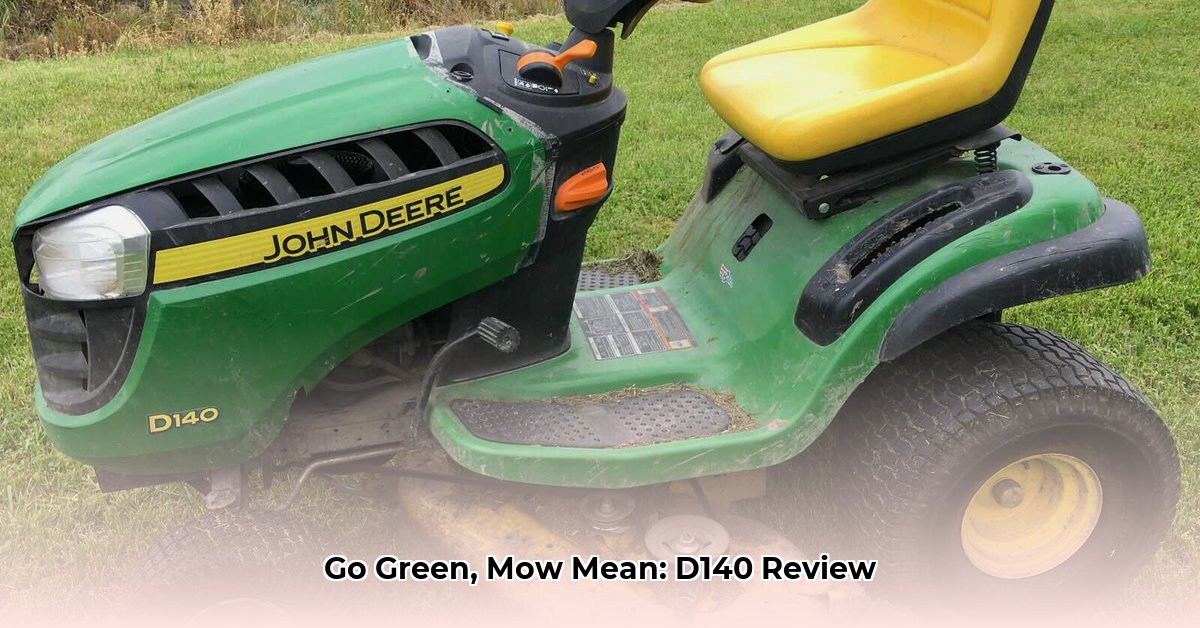
Performance: A Workhorse for Your Yard
The John Deere D140, a model popular from 2011-2017, is a reliable residential lawn tractor. Powered by a Briggs & Stratton engine (40 or 44 series), it offers sufficient power for most yards. While not exceptionally fast, it provides efficient mowing performance. User reviews consistently praise its ease of operation and comfortable seat. But how does this translate to its environmental impact? Does its dependable performance justify any environmental compromises? For added functionality, consider John Deere attachments.
The Green Factor: Environmental Impact Assessment
A gas-powered lawn tractor inherently presents environmental challenges. The D140, despite utilizing a relatively smaller engine for improved fuel economy compared to larger models, still relies on gasoline. This results in greenhouse gas emissions, contributing to climate change. Its fuel tank holds approximately 15 liters (9.1 liters for the California model), allowing for a reasonable mowing duration before refueling. However, the gasoline itself remains environmentally problematic.
Furthermore, the ease of recycling the D140 at its end-of-life is unclear, raising concerns about its overall sustainability. The tractor's versatility, accepting attachments like snow blowers or tillers, offers some environmental benefit by potentially reducing the need for multiple machines. However, these attachments also frequently run on gasoline, partially negating the positive impact of versatility. We need to consider the full lifecycle impact.
Cost Analysis: Balancing Budget and Sustainability
While a used D140 offers affordability compared to newer models, ongoing costs must be considered. Regular maintenance (oil changes, blade sharpening, potential repairs) accumulates over time. The cost of gasoline constitutes a substantial ongoing expense. Even with its comparatively better fuel economy versus larger tractors, fuel costs remain significant. Balancing these operational costs against the initial purchase price and the versatility afforded by attachments requires careful consideration.
Electric Alternatives: A Greener Path?
Electric lawn tractors represent a significantly greener alternative, eliminating direct greenhouse gas emissions. However, they typically entail a higher upfront cost and may not match the power or runtime of gasoline models. Long-term parts availability for electric models also requires careful assessment, influencing overall maintenance costs over the machine's lifespan. The choice depends on individual priorities and long-term cost projections.
The Verdict: Performance vs. Planet
The D140 provides reliable and efficient mowing performance but falls short of being a truly environmentally friendly option. Its smaller engine improves fuel efficiency, but it still operates on gasoline which poses environmental challenges. The lack of readily available information regarding its end-of-life recyclability further diminishes its green credentials. Whether the performance outweighs the environmental trade-offs is a decision each individual must make based on their priorities and values.
Sustainable Lawn Care: Practical Steps
Beyond the tractor itself, sustainable lawn care involves several key practices:
- Maximize Fuel Efficiency: Regularly sharpening your blades significantly improves fuel efficiency and reduces mowing time, resulting in lower emissions. A sharp blade also provides a healthier lawn, potentially reducing the need for chemical fertilizers.
- Consider Alternatives: When replacing your mower, explore electric or other alternative-fuel options such as propane; the technology is continuously evolving, paving the way for greener solutions.
- Responsible Disposal: Ensure proper disposal of your D140 (or any lawn equipment) at an approved recycling center to reduce landfill waste and minimize environmental harm.
Embracing sustainable lawn care goes beyond equipment selection and involves thoughtful consideration of overall environmental impact and responsible practices.
Key Takeaways
- Regular maintenance significantly extends the D140's lifespan, reducing the need for replacements and minimizing its environmental impact.
- Promptly addressing minor issues prevents major repairs, conserving resources and reducing emissions associated with extensive work.
- Sustainable practices encompass more than just the machine itself; responsible fuel management and waste disposal are equally crucial.